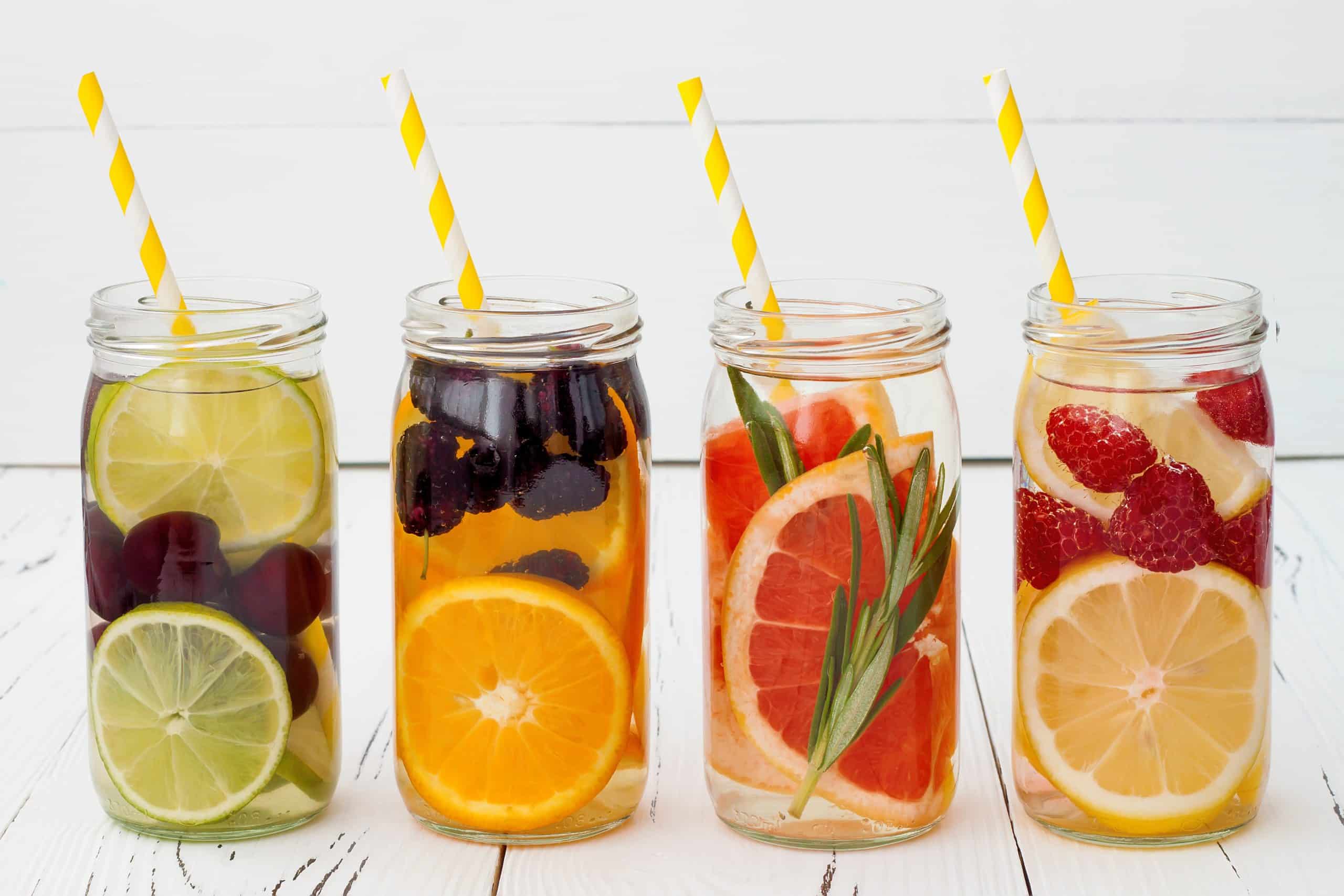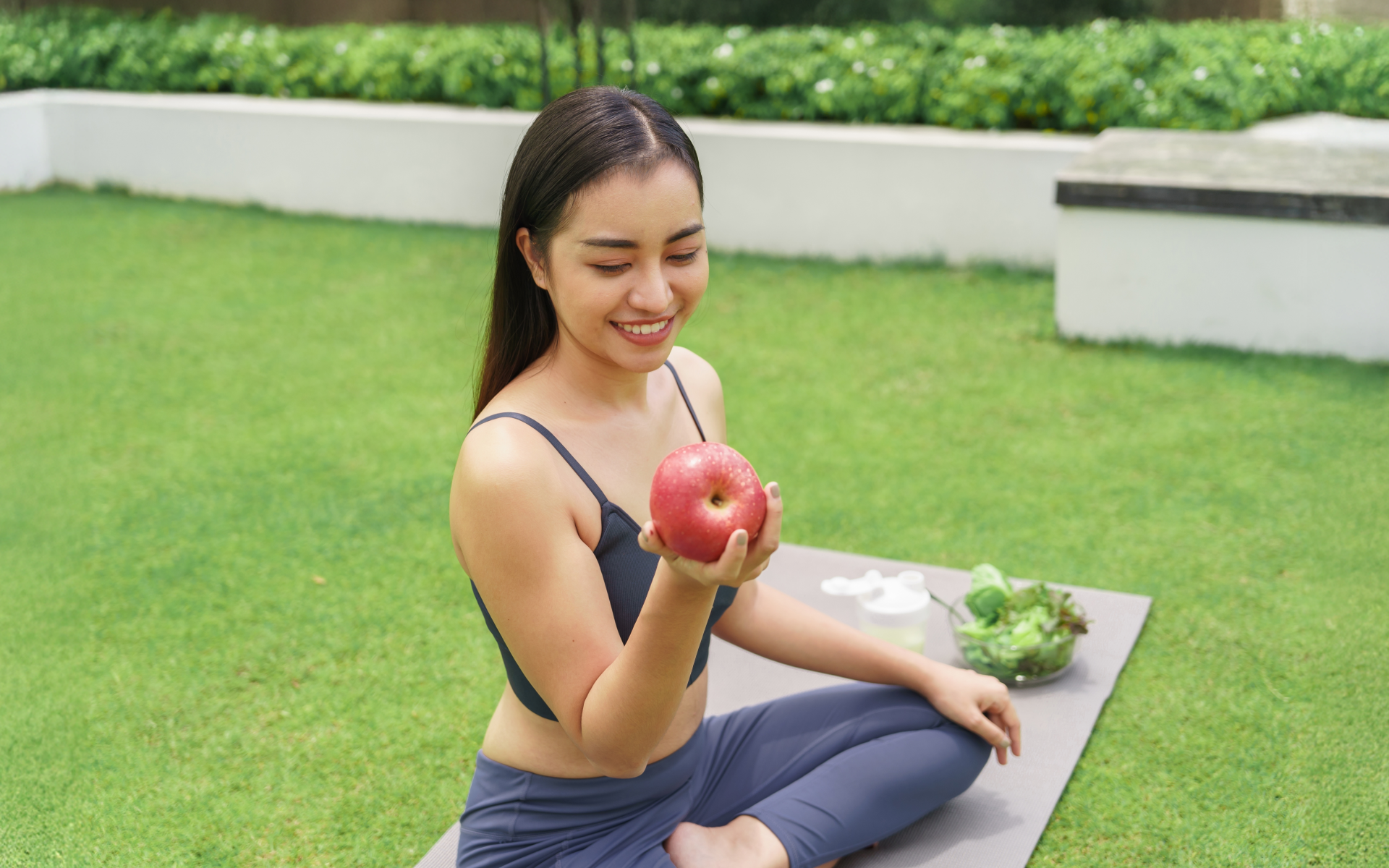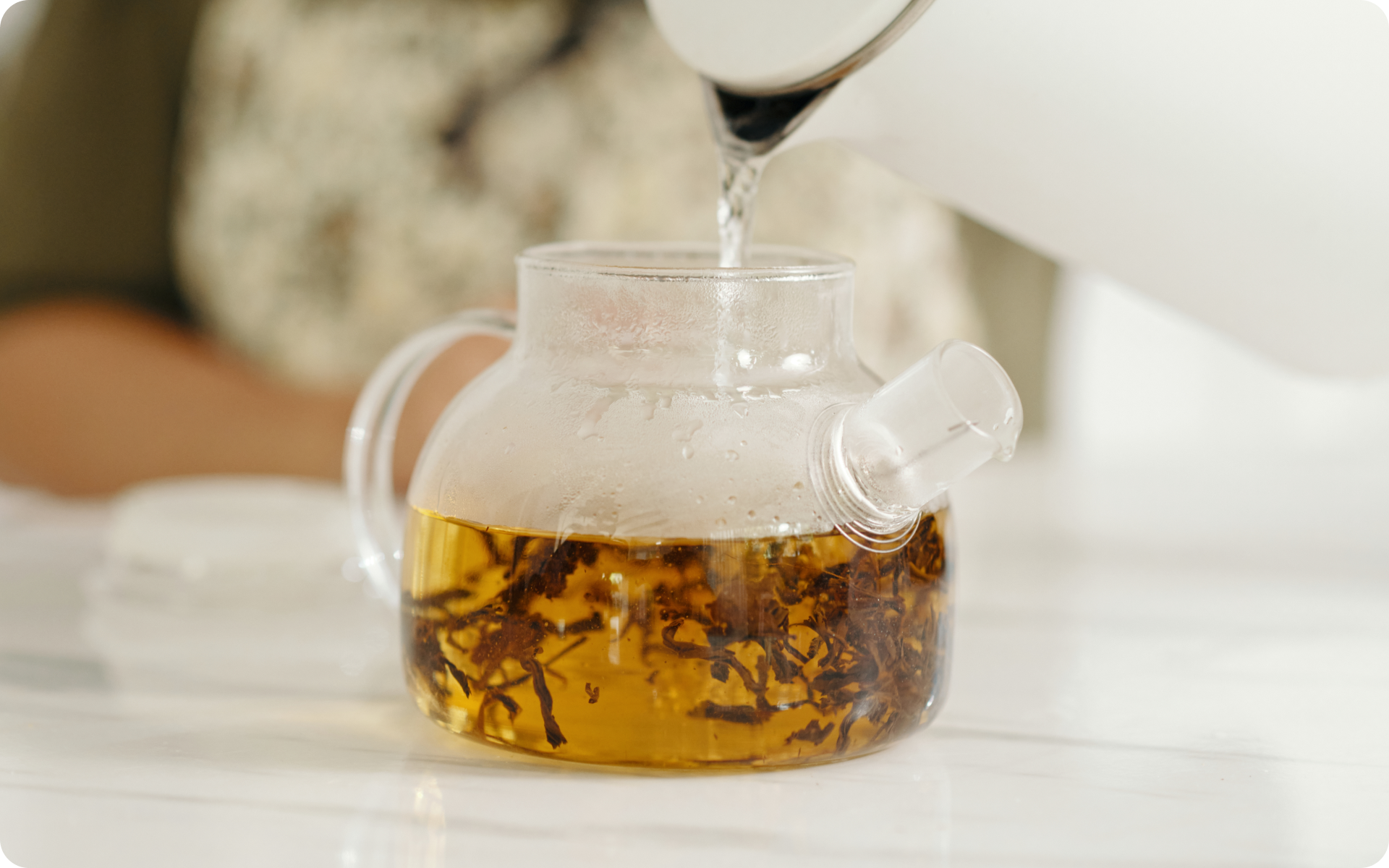Adding fruit to water is healthy. Fruit is naturally sweet, so it can add a pleasant flavor to your water without the health downsides of added sugars or artificial sweeteners. Additionally, fruit is loaded with vitamins, minerals, and antioxidants that can provide many health benefits (20). Herbs are a great option for flavoring water while trying to lose weight. They add a subtle yet unique taste and are calorie-free, making them a great alternative to sugary drinks or artificial sweeteners. Examples of herbs that can be used as healthy water flavoring include mint, basil, rosemary, and sage. Low calorie fruit, like lemon slices, or cucumber can also be used to add flavor without adding excess calories. Discover the science behind water for weight management in our blog post – Drinking Water Before Bed For Weight Loss. Naturally flavored water is healthier than soda for several reasons. First, it doesn’t contain any added sugars or artificial sweeteners, both of which can have negative impacts on our health. Second, flavored water often contains additional nutrients and antioxidants from the fruits, herbs, and other ingredients used to flavor it. Lastly, drinking flavored water can help you stay hydrated without consuming as many calories as soda. Lemon in water is good for you. Lemons are a great source of vitamin C and antioxidants, which can boost your immune system and protect against cell damage (16). Additionally, lemon water can help with digestion and may aid in weight loss by promoting feelings of fullness and reducing bloating. Most importantly, flavoring water with lemon can help you drink enough water throughout the day, which is essential for overall health. Check out our blog – 14-Day Lemon Water Challenge for more info on health benefits, and tips.FAQs
Is Adding Fruit to Water Healthy?
What Can I Flavor My Water With To Lose Weight?
Is Flavored Water Healthier Than Soda?
Is Lemon In Water Good for You?
Unfortunately, not everyone finds plain water appealing. It’s tempting to reach for flavored water options available on the market. A traditional option is to add sugary syrups or powdered mixes to jazz up the taste. However, these often contain artificial sweeteners, additives, or excessive added sugar, each of which come with their own set of health concerns.
With this in mind, what should health-conscious individuals do to make sure they meet their hydration needs without resorting to chemical-laden alternatives?
Here’s a list of 30 healthy ways to flavor water naturally. Each of these options adds a refreshing twist to plain water without harming your health.
How Can I Flavor Water Without Chemicals?
Fruits, herbs and even vegetables can be used to add flavor to your water without any added chemicals. “Chemicals” in this case refers to artificial sweeteners, preservatives to extend shelf life, and other additives not originally in the water that are commonly found in flavored drinks.
Before we get into healthy ways to flavor water at home, let’s discuss why artificial sweeteners and other chemicals may not be the best choice for your body.
Artificial sweeteners are chemically-made sugar substitutes that mimic the taste of sugar. They have zero calories and are marketed as a healthier alternative to sugar, due to their lack of sugar and caloric content. Some examples of artificial sweeteners include aspartame, sucralose, and saccharin (5).
Regulatory agencies like the FDA, EFSA (European Food Safety Authority), and WHO (World Health Organization) have deemed many artificial sweeteners safe for consumption within certain limits (7) (26). However, growing evidence suggests that careful moderation is necessary to prevent long-term health issues.
Here are several reasons why artificial sweeteners might not be the best choice for flavoring water:
May Alter Taste Preferences
Regular consumption of artificially sweetened beverages can lead to a preference for sweet foods and drinks, potentially making naturally sweetened foods less appealing and encouraging sugar cravings.
Linked to Weight Gain and Obesity
Contrary to the belief that they aid in weight loss, some studies suggest that long-term use of artificial sweeteners may be associated with weight gain, increased waist circumference, and higher incidence of obesity (9). This might be due to changes in metabolism, alterations in gut bacteria, or an individual’s overconsumption of other types of food.
Potential Impact on Gut Health
Emerging research indicates that artificial sweeteners can alter the gut microbiota, potentially leading to dysbiosis (imbalance) which has been linked to metabolic disorders, including glucose intolerance (15).
Increased Risk of Type 2 Diabetes
Some studies have observed an association between long-term consumption of artificial sweeteners and an increased risk of developing type 2 diabetes (4). These mechanisms are not fully understood but may involve alterations in gut bacteria and insulin sensitivity.
Risk of Cardiovascular Diseases
Research suggests there may be a link between the consumption of artificially sweetened beverages and an increased risk of cardiovascular diseases, such as stroke and heart disease (22).
Headaches and Migraines
Some individuals report headaches or migraines, which they attribute to the consumption of artificial sweeteners like aspartame (8), though responses can be individual.
Intense sweat sessions, working weight loss tips, lip-smacking recipes come in one package with the BetterMe app. And all of it is at your fingertips, start transforming your life now!
Psychological Effects and Eating Disorders
There is concern that artificial sweeteners could affect psychological responses to food and may be linked to behaviors characteristic of eating disorders. For instance, they might encourage overeating by disconnecting the link between sweet tastes and caloric intake (6).
Potential Allergic Reactions
Though rare, some artificial sweeteners can cause allergic reactions in sensitive individuals. These reactions can range from mild to severe (24).
Environmental Impact
The production and disposal of artificial sweeteners may have environmental impacts, including pollution and contribution to waste.
Questionable Impact on Cravings and Consumption Patterns
While intended to reduce calorie intake, artificial sweeteners may not decrease overall cravings for sweets and may lead people to compensate by consuming more calories from other sources.
Why Not Use Sugar to Flavor Water?
Sugar is the most commonly used sweetener and flavor enhancer in food and beverages. However, excessive sugar consumption is associated with adverse health effects like weight gain, tooth decay, and increased risk of chronic diseases such as diabetes and heart disease (14).
The American Heart Association recommends limiting added sugars to no more than 6 teaspoons (25 grams) per day for women and 9 teaspoons (36 grams) for men (1), due to association of high added sugar consumption with many chronic illnesses. Unfortunately, most flavored drinks contain much more sugar than this amount.
So, while using sugar may be a natural option for flavoring water, it’s essential to do it in moderation.
It’s also important to note that drinking too much water in a short span of time can lead to water intoxication. Find out more about the benefits of adequate water intake and the recommended daily amount in our post – How Much Water Should I Drink a Day To Lose Weight?
What Should I Put In My Water to Make It Taste Better?
Fruit, herbs, and vegetables are fantastic options for naturally flavoring water. You can infuse the flavors of these ingredients into your water by simply adding them to a pitcher or glass of water and letting it sit for a few hours before drinking.
Here are 30 healthy ways to flavor water without sugar, artificial sweeteners or chemicals:
Fruit Infusions
- Lemon and Lime: A classic combination that adds a refreshing citrusy twist to your water.
- Orange and Blueberry: The sweetness of oranges combined with the tartness of blueberries makes for a delicious flavor infusion.
- Watermelon and Mint: This combination is perfect for summertime, adding a hint of sweetness and freshness to your water.
- Pineapple and Ginger: A tropical twist to your water, with the added benefits of anti-inflammatory properties from ginger (18).
- Strawberry and Basil: The sweetness of strawberries pairs perfectly with the earthy flavor of basil.
- Grapefruit and Rosemary: A unique combination that adds a refreshing and slightly herbal taste to your water.
- Kiwi and Cucumber: A light and refreshing combination that’s perfect for hot summer days.
- Peach and Thyme: The sweetness of peaches combined with the subtle herbal flavor of thyme makes this a unique and tasty flavor infusion.
- Raspberry and Sage: A slightly tart yet refreshing combination that’s packed with antioxidants from the raspberries (3) and anti-inflammatory properties from sage (17).
- Mango and Jalapeno: Add some heat to your water with this unique combination that’s both sweet and spicy.
Read more: Calories Burned Water Aerobics, or Why Aquafit is Good For Weight Loss
Herb Infusions
- Lavender and Lemon: A calming and soothing flavor infusion that also adds a beautiful purple hue to your water.
- Basil and Cucumber: The refreshing taste of cucumbers combined with the earthy flavor of basil makes for a delicious herb-infused water.
- Mint and Lime: A refreshing combination that’s perfect for hot days or after a workout.
- Rosemary and Lemon: The earthy flavor of rosemary, combined with the tartness of lemon makes for a unique and tasty herb-infused water.
- Thyme and Orange: A warm and slightly citrusy infusion that’s perfect for cooler weather.
- Sage and Peach: The subtle herbal flavor of sage pairs perfectly with the sweetness of peaches.
- Cilantro and Orange: A refreshing and slightly tangy infusion that’s packed with antioxidants from fresh cilantro (11).
- Ginger and Lemongrass: Add a little spice to your water with this unique combination that also has anti-inflammatory properties from the ginger (18).
- Dill and Cucumber: A refreshing and savory infusion that’s perfect for a hot summer day.
- Chamomile and Apple: A calming and soothing herb-infused water that’s perfect for winding down in the evening.
Bonus: Ingredients to Boost Your Water
- Apple Cider Vinegar: A small amount of apple cider vinegar can add a tangy and slightly sweet flavor to your water, along with potential health benefits like improved blood sugar control and a positive effect on blood lipid levels (23).
- Chia Seeds: These tiny seeds can soak up water and add a subtle texture to your drink, along with added nutrients such as omega-3 fatty acids and fiber.
- Himalayan Salt: A pinch of Himalayan salt can add trace minerals to your water, along with enhancing the flavor.
- Honey: Instead of artificial sweeteners, opt for a small amount of honey to sweeten your water naturally. Honey also has antibacterial and antioxidant properties (21).
- Coconut Water: Add some electrolytes to your water by mixing in a small amount of coconut water.
- Aloe Vera: Add a small amount of fresh aloe vera gel to your water for potential antioxidant and anti-inflammatory benefits (2).
- Matcha Powder: For a boost of energy and antioxidants (19), add some matcha powder to your water. Its savory umami flavor may not be for everyone, but it’s worth trying!
- Cinnamon Sticks: Adding cinnamon sticks to your water can add a subtle sweetness along with potential health benefits such as improved blood sugar control and anti-inflammatory properties (10).
- Turmeric: Add a small amount of turmeric powder to your water for potential anti-inflammatory and antioxidant benefits (25). You might also want to add a pinch of black pepper, which can enhance the absorption of turmeric (12).
- Vanilla Extract: A few drops of vanilla extract can add a sweet and comforting flavor to your water with only trace added sugars.
Whether you’re looking to simply pep up your fitness routine, jazz up your diet with mouth-watering low-calorie recipes or want to get your act together and significantly drop that number on your scale – BetterMe app has got you covered! Improve your body and revamp your life with us!
FAQs
Is Adding Fruit to Water Healthy?
Adding fruit to water is healthy. Fruit is naturally sweet, so it can add a pleasant flavor to your water without the health downsides of added sugars or artificial sweeteners. Additionally, fruit is loaded with vitamins, minerals, and antioxidants that can provide many health benefits (20).
What Can I Flavor My Water With To Lose Weight?
Herbs are a great option for flavoring water while trying to lose weight. They add a subtle yet unique taste and are calorie-free, making them a great alternative to sugary drinks or artificial sweeteners.
Examples of herbs that can be used as healthy water flavoring include mint, basil, rosemary, and sage. Low calorie fruit, like lemon slices, or cucumber can also be used to add flavor without adding excess calories.
Discover the science behind water for weight management in our blog post – Drinking Water Before Bed For Weight Loss.
Is Flavored Water Healthier Than Soda?
Naturally flavored water is healthier than soda for several reasons.
First, it doesn’t contain any added sugars or artificial sweeteners, both of which can have negative impacts on our health. Second, flavored water often contains additional nutrients and antioxidants from the fruits, herbs, and other ingredients used to flavor it.
Lastly, drinking flavored water can help you stay hydrated without consuming as many calories as soda.
Is Lemon In Water Good for You?
Lemon in water is good for you. Lemons are a great source of vitamin C and antioxidants, which can boost your immune system and protect against cell damage (16).
Additionally, lemon water can help with digestion and may aid in weight loss by promoting feelings of fullness and reducing bloating. Most importantly, flavoring water with lemon can help you drink enough water throughout the day, which is essential for overall health.
Check out our blog – 14-Day Lemon Water Challenge for more info on health benefits, and tips.
The Bottom Line
While flavored water may seem like a healthier alternative to soda or other sugary drinks, it’s essential to be mindful of the ingredients used to add flavor.
Natural options like fruit and herbs can provide a delicious and healthy alternative to artificial sweeteners, which may have potential health risks.
Experiment with different combinations of fruits and herbs to find your favorite flavors and enjoy the benefits of staying hydrated without compromising your health. Knowing this, next time you reach for a flavored drink, consider adding some natural flavoring ingredients to your water.
DISCLAIMER:
This article is intended for general informational purposes only and does not serve to address individual circumstances. It is not a substitute for professional advice or help and should not be relied on for making any kind of decision-making. Any action taken as a direct or indirect result of the information in this article is entirely at your own risk and is your sole responsibility.
BetterMe, its content staff, and its medical advisors accept no responsibility for inaccuracies, errors, misstatements, inconsistencies, or omissions and specifically disclaim any liability, loss or risk, personal, professional or otherwise, which may be incurred as a consequence, directly or indirectly, of the use and/or application of any content.
You should always seek the advice of your physician or other qualified health provider with any questions you may have regarding a medical condition or your specific situation. Never disregard professional medical advice or delay seeking it because of BetterMe content. If you suspect or think you may have a medical emergency, call your doctor.
SOURCES
- Added Sugars (2021, heart.org)
- Aloe vera (L.) Webb.: Natural Sources of Antioxidants – A Review (2019, link.springer.com)
- Antioxidant, Anti-Inflammatory and Cytotoxic Activity of Phenolic Compound Family Extracted from Raspberries (Rubus idaeus): A General Review (2022, ncbi.nlm.nih.gov)
- Artificial Sweeteners and Risk of Type 2 Diabetes in the Prospective NutriNet-Santé Cohort (2023, ncbi.nlm.nih.gov)
- Artificial sweeteners – a review (2014, ncbi.nlm.nih.gov)
- Artificial sweetener use among individuals with eating disorders (2006, pubmed.ncbi.nlm.nih.gov)
- Aspartame and Other Sweeteners in Food (2023, fda.gov)
- Aspartame ingestion and headaches: a randomized crossover trial (1994, pubmed.ncbi.nlm.nih.gov)
- Chronic Low-Calorie Sweetener Use and Risk of Abdominal Obesity among Older Adults: A Cohort Study (2016, ncbi.nlm.nih.gov)
- Cinnamon as a Complementary Therapeutic Approach for Dysglycemia and Dyslipidemia Control in Type 2 Diabetes Mellitus and Its Molecular Mechanism of Action: A Review (2022, ncbi.nlm.nih.gov)
- Coriander (Coriandrum sativum) Polyphenols and Their Nutraceutical Value against Obesity and Metabolic Syndrome (2023, ncbi.nlm.nih.gov)
- Development of a rapid, sensitive, and selective LC–MS/MS method for quantifying curcumin levels in healthy human urine: Effect of pepper on curcumin bioavailability (2022, ncbi.nlm.nih.gov)
- Dietary Guidelines for Americans, 2020-2025 (2020, dietaryguidelines.gov)
- Dietary sugar consumption and health: umbrella review (2023, ncbi.nlm.nih.gov)
- Effect of Non-Nutritive Sweeteners on the Gut Microbiota (2023, ncbi.nlm.nih.gov)
- Effects of Citrus Fruit Juices and Their Bioactive Components on Inflammation and Immunity: A Narrative Review (2021, frontiersin.org)
- Evidence for anti-inflammatory effects and modulation of neurotransmitter metabolism by Salvia officinalis L. (2022, biomedcentral.com)
- Ginger on Human Health: A Comprehensive Systematic Review of 109 Randomized Controlled Trials (2020, ncbi.nlm.nih.gov)
- Health Benefits and Chemical Composition of Matcha Green Tea: A Review (2021, ncbi.nlm.nih.gov)
- Health Benefits of Fruits and Vegetables (2012, sciencedirect.com)
- Honey: its medicinal property and antibacterial activity (2011, ncbi.nlm.nih.gov)
- Sugar- and Artificially Sweetened Beverages Consumption Linked to Type 2 Diabetes, Cardiovascular Diseases, and All-Cause Mortality: A Systematic Review and Dose-Response Meta-Analysis of Prospective Cohort Studies (2021, ncbi.nlm.nih.gov)
- The effect of apple cider vinegar on lipid profiles and glycemic parameters: a systematic review and meta-analysis of randomized clinical trials (2021, biomedcentral.com)
- The Impact of Artificial Sweeteners on Human Health and Cancer Association: A Comprehensive Clinical Review (2023, ncbi.nlm.nih.gov)
- Turmeric and Its Major Compound Curcumin on Health: Bioactive Effects and Safety Profiles for Food, Pharmaceutical, Biotechnological and Medicinal Applications (2022, frontiersin.org)
- WHO advises not to use non-sugar sweeteners for weight control in newly released guideline (2023, who.int)









